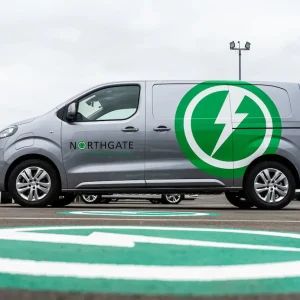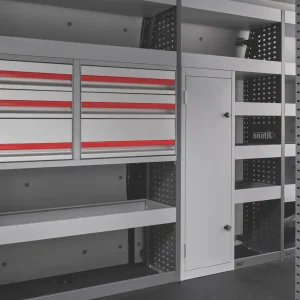The Freight Transport Association’s Van Excellence scheme – a code of practice for van operators and drivers designed to improve standards in the industry – has been running for more than five years, and at the last count the FTA had signed up 103 commercial vehicle operators.
Mark Cartwright, the organisation’s van boss and the person driving the accreditation process, says the scheme continues to grow among larger fleets.
“As of today we have 103 accredited operators running just shy of 125,000 vans, and there’s a significant degree of interest, a very strong tail of operators preparing to be accredited,” Cartwright tells What Van? “There has been a shift – we always knew who was getting ready, but now we get people calling us up and saying they are ready to be audited.”
He said the association is adding around four or five new members per month, with 130 the next landmark target.
“We’re quite proud that it’s not a BSI or ISO audit [in terms of audit process and time]. It won’t take up three months of your life and it takes most operators half a day to present and then they either pass or fail.” He says the ones that fail generally expect it, and the FTA has been known to be used as a “Trojan horse” to help compliance officers get a message across.
Cartwright now wants to see smaller fleets coming on board, and plans are afoot to increase the number of smaller operators joining the scheme, but he understands that the up- front cost of nearly £600 is a bit steep for them. “The starting point was talking to some of our larger operators who were keen to demonstrate leadership, because it’s all very well sorting your own business but it doesn’t stop you or your loved ones being taken out by an unroadworthy driver or vehicle,” he declares.
“We’re not just victims, we can influence. For example, you know a builder’s van isn’t roadworthy but you still employ him.”
The small fleet solution will cost £40 a month, and also includes a fleet management package for up to 10 vehicles through fleet management software firm Fleet Check.
“Within that package you get electronic access to Van Excellence, news emails, limited access to the call centre, and when you are ready to go for accreditation we can carry out a remote audit through the fleet management system,”
explains Cartwright, who said the main route to market will be for businesses to encourage its contractors to get involved. Looking at the range of businesses accredited to Van Excellence, Cartwright says they will all have contractors or other people they can influence, from saying it’s something a company would like its contractors to do, through to mandating it for all associated firms.
But why does Van Excellence even exist at all?
Cartwright says the role of Van Excellence is to demonstrate that “as an industry we are entirely capable of a regulatory scheme”, and don’t need anything new.
“I don’t see anything in the code that is unreasonable. It’s all good practice, and around the three areas of the driver, the business and the vehicle,” he continues. “Manufacturers can tell you how car-like the driving experience of their van is, but a badly loaded, badly maintained hi-cube long- wheelbase van goes off being car-like very quickly.”
Training
The FTA also offers training off the back of its code of practice and guide, and operates a Certificate of Excellence in Van Operations, a half-day FTA-branded qualification valid for three years.
“We puffed our chest out [and branded it FTA] rather than it being a City and Guilds or NVQ,” says Cartwright. He adds that the primary market is managers and supervisors with van responsibility, although
the FTA has found a secondary audience in the form of van staff from manufacturers and leasing or rental companies.
The association also offers 10 free-of-charge van fleet management guides for people registering on its website, covering various subjects. Driver training is also on the agenda, with the FTA close to launching a Van Excellence Certificate of Driver Competence.
“A number of people want to upskill drivers and recognise that qualification. We’ve got some pretty chunky interest in this,” Cartwright says.
He also argues that Van Excellence members should see a better residual value return on their vehicles.
“A BT van will, for example, get a great return because it’s been well specced and well maintained, and it’s spent most of its life parked by the side
of the road,” he says. “Van Excellence vans should get a better value because they are doing all the things that shouldmake for a good residual value.” In addition Cartwright wants to see more attention on the van market from enforcement.
“Vans seem to have a charmed life with roadside enforcement,” he continues. “We know there’s a problem because there’s a 50% MoT failure rate [with vans], so people are treating vans like cars and chucking them into the MoT to see what they fail on – that’s not acting like professional drivers.”
The FTA would like to see greater visibility from the Driver and Vehicle Standards Agency in enforcing standards.
“The majority of truck operators are habitually compliant and I’d say Van Excellence operators are, but that still leaves a lot of vans.”
Making amends
The FTA made only its second amendment to the code of practice standards recently, and both have been around the topic of speed.
The governance group that FTA van boss Mark Cartwright describes as “my conscience” is made up of operator members, and they have to agree any changes. “We can’t change the code without going through them,” he says. “They own Van Excellence so when we say it’s by the industry for the industry, it’s not just a line.” The first change concerned an exception to the mandatory fitment of a 70mph speed limiter. “We forgot about ambulances, so now there’s a concession for anything with a blue light on top,” explains Cartwright. The second change sees an alternative to the mandatory speed limiter. “We recognized that there are other ways of managing speed, rather than limiting to 70, which has the appeal of being easy,” he says. “We recognize robustly policed and managed telematics speed management programmes as being accredited, but the key is that we need to see them robustly policed.”
That, explains the FTA’s van man, allows “contextual speeding” to come into play, rather than a 70mph speed limiter that doesn’t have an effect on speeding in places where the limit is under 70.
Speed limiters are something Cartwright is keen to push further, and has issued a challenges to manufacturers, rental and leasing companies to see if one will be the first to limit its vans to 70mph by default, and make operators ask to have the limit removed. “What other piece of industrial equipment would allow you to break the law?” he questions. “We’re close to getting one rental company but the marketing people are worried it will put people off.”
The importance of the van market
The Freight Transport Association is on a mission to emphasise the importance of the light commercial vehicle market amid attacks on diesel vehicles in urban areas. “If you want to see how important vans are to the UK PLC and GDP then just look out of your window in the morning and count how many vans you see,” says FTA head of vans Mark Cartwright. “We have to make the point that vans power the economy, but with that comes responsibility and you have to make sure you do things properly.”
He talks of a “charm offensive”, and that the FTA is attempting to calculate how many light commercials are operating in different sectors, for example if civil engineering has a certain number of vehicles in the sector, and the sector contributes a certain amount, then each civil engineering van contributes X to UK GDP.





